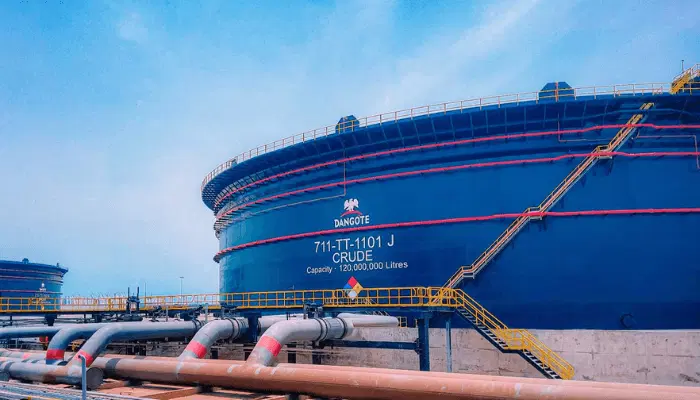Africa’s richest man and leading industrialist, Alhaji Aliko Dangote, has reaffirmed his dedication to developing local talent and empowering Nigerian engineers through major industrial ventures, notably the multi-billion-dollar Dangote Petroleum Refinery in Ibeju-Lekki, Lagos.
During a facilities tour of the 650,000 barrel per day refinery, which is billed as the largest single-train refinery in the world, Dangote made the commitment on Monday while hosting a delegation from the Nigerian Society of Engineers (NSE), Lagos Branch.
Reflecting on the magnitude of the project, Dangote admitted that the complexity of the refinery exceeded initial expectations.
“Honestly, if we had fully understood the magnitude and challenges involved, we may not have even attempted it. But it was our courage nor perhaps naivety that got us this far,” he remarked.
According to him, the facility is built to accommodate immense operational demands, with expectations to receive over 600 product vessels and around 240 crude oil tankers annually.
Dangote highlighted the environmental and logistical challenges faced during the refinery’s construction, including extensive swamp reclamation and the dredging of 65 million cubic metres of sand from 20 kilometres offshore — all executed while consciously protecting the livelihoods of coastal communities.
“We had to manually uproot thousands of trees and spent 18 months on sand-filling alone. But we deliberately preserved the surrounding environment, especially for the fishermen who depend on it,” he said.
Responding to an inquiry on how local engineers can gain more opportunities, Dangote reaffirmed his commitment to human capital development.
“There are many more projects in the pipeline, and we intend to keep strengthening our engineering capacity. Even when we don’t have immediate openings, we must continue to train. Skills are assets — whether deployed at home or abroad. Nigeria must begin to export knowledge, not just crude oil,” he stated.
He further disclosed that although the refinery was originally designed to employ up to 50,000 foreign workers, only 12,000 to 14,000 expatriates were engaged. The majority of the workforce, including engineers, fitters, and welders, were Nigerians.
“Eighty-five per cent of the commissioning was executed by Nigerians. It’s not just because I am an engineer, but because our people have proven their capacity. Today, we are our own EPC contractors — we are building Nigeria by ourselves,” Dangote affirmed.
He urged NSE members to see the refinery as a symbol of what Nigeria can achieve through homegrown innovation, professionalism, and determination.
On her part, the Chairman of NSE Lagos Branch, Mrs Olukorede Kesha, described the refinery as a major engineering feat for Africa and commended Dangote’s foresight in investing in indigenous capacity.
“This is a groundbreaking development not just for Nigeria but for the entire continent. Visiting the facility has been both enlightening and inspiring,” she said.
Kesha applauded the dominance of Nigerian professionals on the project, stating that initiatives like the refinery could catalyze tackling unemployment and poverty.
“We are proud to see Nigerians leading from the front. If we can replicate this kind of industrial development across sectors, Nigeria will not only solve its internal challenges but will emerge as a global exporter of both refined products and professional talent,” she added.

